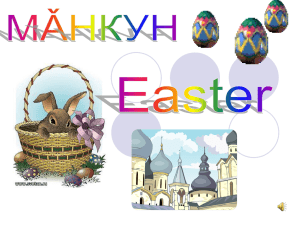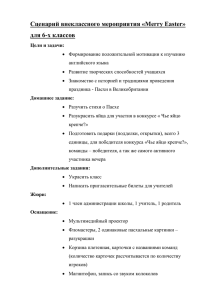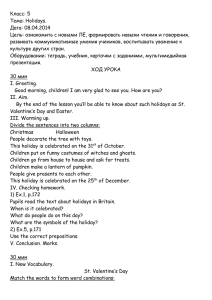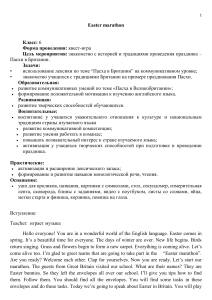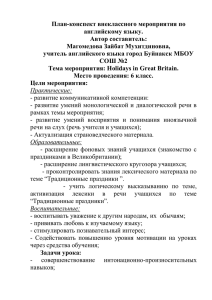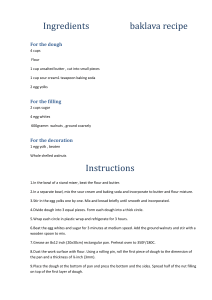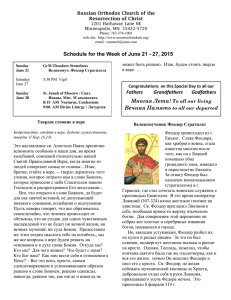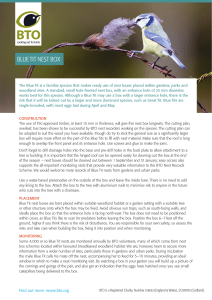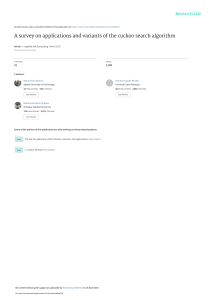AMAZING FACTS ABOUT EASTER
реклама
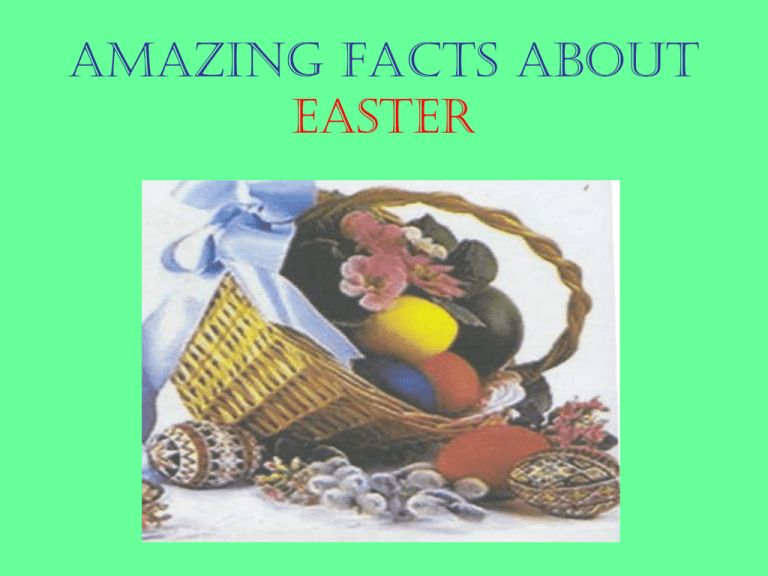
AMAZING FACTS ABOUT EASTER WORDS • • • • • • • • • Easter [‘i:stə]- Пасха origins [‘oridʒinz] – начало, истоки pre-Christian [pri:’krisʧən] - дохристианский goddess [‘godis]- богиня Eostre [‘i:strə]- богиня весны Истра (Эостра) reign [rein]- царствование chariot [ʧæriət]- колесница companion [kəm’pæniən]- попутчик,спутник to accompany [ə‘kʌmpəni]- сопровождать • resurrection [,rezə`rekʃn] – воскресение, восстание из мёртвых (Христа) • Jesus Christ [dӡi:zəs `kraist] – Иисус Христос • crucifixion [,kru:si`fikʃn ] – распятие на кресте (казнь) • Lent [lent] – Великий пост • Good Friday [gud fraidi] – Страстная пятница • to crucify [`kru:sifai] – распять • Bank holiday [bæŋk holədi] – официальный нерабочий день • rebirth [ri:bз:θ] – возрождение • Druid [dru:id] – друид, жрец • to dye [dai] – красить, окрашивать • to honour [`onə] – чествовать, восславлять • grave [greiv] - могила • • • • • • • • • • • hard-boiled [,ha:d 'boild] - сваренный вкрутую (о яйце) elaborate [i`læbrit] - искусно сделанный, замысловатый to survive [sə 'vaiv] - зд. сохраняться precious ['preʃəs] - драгоценный enamel [i'næməl] - эмаль gem stone [dӡem stoun] – драгоценный камень synonym [`sinənim] – синоним luxury [`lʌkʃəri] – роскошь Easter Bunny[i:stə bʌni] – пасхальный кролик hunt [hʌnt] – охота, поиски bonnet [`bonit] – дамская шляпа ORIGINS • Easter is a very old festival. In pre-Christian times people used to celebrate the start of spring and 'new life'. • The word 'Easter' comes from the name of a pre-Christian goddess called Eostre. • According to legend, Eostre was a playful goddess whose reign began in the spring when the Sun King travelled across the sky in his chariot, bringing the end of winter. • • Eostre came down to earth then, appearing as a beautiful girl with a basket of bright colorful eggs. • Her magical companion was a rabbit who accompanied her as she brought new life to dead plants and flowers by hiding the eggs in the fields. A CHRISTIAN HOLIDAY • Easter is a holiday in late March or early April. It's always on the first Sunday after the full moon of spring. • On Easter Sunday, Christians celebrate the resurrection of Jesus Christ after his crucifixion. • It's the end of Lent and the most important date in the Christian year. Many people who don't go to church at other times go on Easter Sunday. • The Friday before Easter Sunday is called Good Friday and is remembered as the day when Christ was crucified. • The Monday after Easter Sunday is called Easter Monday. • In Britain, Good Friday and Easter Monday are both bank holidays. Children do not go to school. Banks and shops are closed. • In the United States, each company decides for itself whether to close or remain open. EASTER EGGS • Eggs have been a symbol of resurrection and rebirth since PreChristian times. The Druids dyed eggs bright red to honour the Sun and Anglo-Saxons painted and decorated eggs in honour of the Goddess Eostre. They also put eggs on graves. • Today, people paint and decorate hard-boiled eggs in all sorts of way and give them to their friends. A modern custom, however, is to use chocolate eggs instead. • They are popular with both children and adults and millions are sold in the weeks before Easter. Inside each egg are sweets chocolates, smaller eggs or toys. THE EASTER BUNNY • When American children wake up on Easter morning, they hope that Easter Bunny, an imaginary rabbit, has visited their homes. • Parents tell their children that the Easter Bunny goes from house to house while they are sleeping. It hides plastic egg stilled with sweets or little presents somewhere in the house or garden. • When they wake up, all the children run about trying to find the eggs. The Easter Bunny also brings chocolate in the shape of rabbit. In many ways, it's like a Claus. ARTISTIC CREATIONS • The most elaborate painted eggs in the world were made in Russia by the Faberge company. • The most famous eggs were made for Alexander III and Nicholas II. Of the 50 made, 42 have survived! • The eggs were made of precious metals or stones and decorated with enamel and gem stones. The term 'Faberge egg' has become a synonym of luxury. AN EASTER EGG HUNT • In Britain, some families now organize an Easter egg hunt. Real or chocolate eggs are hidden in different places. • The game may be both indoors and outdoors. • When the hunt is over, prizes may be given out -for the largest number of eggs gathered, for the largest or smallest egg, for the most eggs of a specific color, consolation prizes, etc. EGG ROLLING • Egg rolling, or an Easter egg roll is a traditional game played with eggs at Easter. • The rules are simple: find a large hill and roll the painted eggs down the hill. • The last egg to break is the winner! • In the United States, the most famous Easter Egg Roll is held on the White House lawn, where children push eggs through the grass. • There's also live music, storytelling and other interesting events EASTER BONNETS • It was once common for people to wear new clothes to church on Easter Sunday. Women wore new hats called Easter bonnets. Today, people sometimes make elaborately decorated Easter bonnets for fun. • Easter is a time when hat parades are very common. Many schools and clubs have Easter Bonnet parades. You can have prizes for biggest, smallest, most colourful, creative hats.
